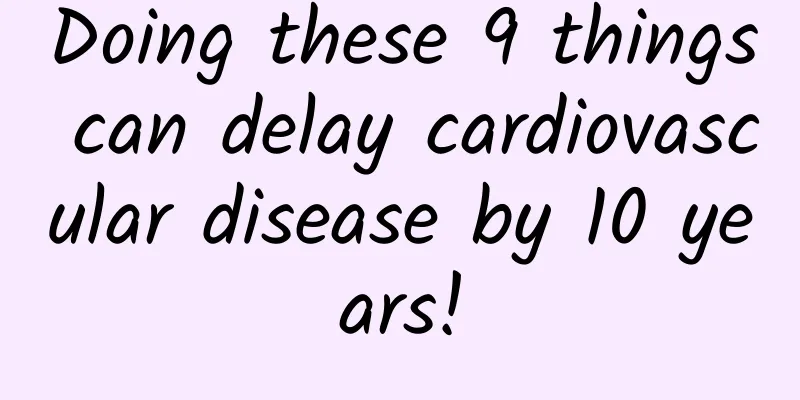Doing these 9 things can delay cardiovascular disease by 10 years!

|
This article was reviewed by Zhang Mingzhi, a postdoctoral fellow at the Fuwai Hospital of the Chinese Academy of Medical Sciences Recently, a new analysis of the Framingham Heart Study showed that primary prevention can delay the onset of cardiovascular and cerebrovascular diseases by ten years. This study evaluated data from 1960 to 2018, nearly 60 years, mainly to determine the time point of myocardial infarction, coronary heart disease and stroke in middle-aged and elderly people. The results showed that if long-term primary prevention can be adhered to, the risk of cardiovascular and cerebrovascular diseases can be reduced and cardiovascular and cerebrovascular diseases can be postponed by 10 years. Among the study subjects, it was found that the life expectancy of men who adhered to primary prevention increased by 10 years, and the life expectancy of women increased by 12 years. The reason is very simple. Think about it, if we take primary prevention measures, we can delay the occurrence of cardiovascular and cerebrovascular diseases. If we do not have myocardial infarction or cerebral infarction, then relatively speaking, we can extend our lifespan. So the question is, what is primary prevention? In simple terms, primary prevention is what we popularize every day, that is, healthy living + controlling the three highs. Specifically, it means doing the following 9 things to effectively prevent cardiovascular and cerebrovascular diseases and prolong life: 1. Diet is important Diet is of course important. The latest research from Xi'an Jiaotong University found that unhealthy diet accounts for 36.9% of all-cause deaths due to cardiovascular disease, which means that deaths from cardiovascular disease caused by unhealthy diet account for 36.9% of all factors. But diet is not simply about not eating something or eating something. A healthy diet means: low salt, less refined grains, low oil, low sugar, more coarse grains, more vegetables and fruits, appropriate supplementation of fish, dairy products, nuts, etc. A diversified, comprehensive and scientific diet is a healthy diet. Copyright image, no permission to reprint Therefore, to eat healthy, we should reduce refined grains, limit processed meat, control fat and offal, reduce red meat appropriately, and continue to increase vegetables, fruits and other ingredients on the basis of low salt, low oil and low sugar. Food must be diversified, and try to eat more than 12 kinds of food every day and more than 25 kinds of food per week. 2. Exercise is indispensable Exercise can not only prevent the three highs, but also exercise cardiopulmonary function and bone muscles; exercise can improve immunity; exercise can prevent cardiovascular and cerebrovascular diseases. It is recommended that you exercise as much as possible, about 5 times a week, each time for no less than 30 minutes. The intensity of exercise should be moderate, such as playing ball, running, cycling, swimming, skipping rope, aerobics, brisk walking, etc. Choose a sport that you like and can stick to. Copyright image, no permission to reprint You can also travel together and encourage each other, which will make it easier to persevere. Regular exercise is beneficial for lowering blood pressure, blood sugar, blood lipids and weight. 3. Don’t be too fat Overweight, especially obesity, is an independent risk factor for the three highs and cardiovascular disease. The increasing incidence of cardiovascular and cerebrovascular diseases is related to the fact that more and more people are obese. According to statistics, nearly 20% of adults are obese. So you should weigh yourself, calculate your BMI (body mass index), measure your waist circumference, and see if you have a big belly. The most effective way to control your weight is to control your diet and exercise. People who are not fat should try not to gain weight, and those who are fat should control their weight as soon as possible. 4. Stay away from tobacco and alcohol Smoking not only damages the lungs, but also increases the risk of lung disease and tumors. It also increases the risk of atherosclerosis, that is, the risk of vascular plaques. The more serious the risk of vascular plaque, the more likely it is to cause cardiovascular and cerebrovascular diseases. Plaque rupture means myocardial infarction or cerebral infarction. So don't smoke, quit smoking, and stay away from secondhand smoke. Copyright image, no permission to reprint Many people always emphasize that drinking alcohol can lower blood pressure, promote blood circulation and remove blood stasis, and soften blood vessels. Now it seems that these are all rumors. Drinking alcohol not only does not lower blood pressure, but also raises blood pressure, increases blood lipids, and aggravates arteriosclerosis. In other words, drinking alcohol makes blood vessels harder, not softer. Therefore, drinking less or no alcohol can protect blood vessels and prevent cardiovascular and cerebrovascular diseases. 5. Don’t stay up late Staying up late will not only cause dark circles under the eyes, sagging skin, increased wrinkles, decreased immunity, and sub-health status. It can also lead to sympathetic excitement, increased heart rate, increased blood pressure, and increased risk of elevated blood lipids and blood sugar. It can also aggravate atherosclerosis, and even long-term staying up late can induce plaque rupture, directly form blood clots, and lead to myocardial infarction or cerebral infarction. So most of the sudden deaths among middle-aged people we hear about are related to staying up late. This is the cardiovascular and cerebrovascular disease caused by staying up late. So not staying up late is also the first-level prevention of cardiovascular and cerebrovascular diseases. 6. Good attitude Human health is divided into two parts, one is physiological, which is what we call various indicators, such as blood pressure, blood sugar, blood lipids, blood draws, liver and kidney function, etc. The other is psychological, which is what we think in our hearts, whether we are mentally healthy or not. For example, long-term depression, depression, pessimism, jealousy, malicious intent, irritability, rage, etc. are all unhealthy mental states. This long-term unhealthy mental state will change from quantitative change to qualitative change over time and become a physiological disease. So for your own health, please be optimistic, positive, sunny, grateful, and helpful. Such a positive energy mentality will be beneficial to physical health and cardiovascular health. 7. Manage your blood pressure Hypertension is the disease with the highest incidence in my country, with nearly 3 in 10 people suffering from it. Long-term hypertension will accelerate arteriosclerosis, leading to the appearance of plaques in blood vessels, and eventually causing cardiovascular and cerebrovascular diseases. Copyright image, no permission to reprint So we need to pay attention to our blood pressure and see if we have high blood pressure. If the blood pressure exceeds 140/90 mmHg, we must see a doctor. We should try to lower the blood pressure to below 120/80 mmHg. This will help better protect blood vessels and prevent cardiovascular and cerebrovascular diseases. 8. Manage your blood sugar If diabetes is not detected or controlled well, it will cause inflammation of the arterial endothelium, which in turn will lead to more plaques in the blood vessels, causing cardiovascular stenosis and cardiovascular and cerebrovascular diseases. Therefore, we should take the initiative to test our blood sugar to see if we have diabetes. If we do, we must control it well to reduce atherosclerosis caused by abnormal blood sugar. Managing blood sugar is the primary prevention of cardiovascular and cerebrovascular diseases. 9. Manage blood lipids When total cholesterol, low-density lipoprotein cholesterol, triglycerides and other three blood lipids increase, the lipid substances in the blood vessels will increase, which is what ordinary people call vascular garbage. Especially when low-density lipoprotein cholesterol increases, more vascular garbage will be produced, leading to cardiovascular and cerebrovascular diseases. Therefore, we must control blood lipids, especially low-density lipoprotein cholesterol. There are three reference values for low-density lipoprotein cholesterol, namely <3.4, <3.6, and <1.8. Please read your own standards carefully. In short, primary prevention has been proven to be effective in preventing cardiovascular and cerebrovascular diseases and prolonging life. But everyone should remember that primary prevention is not a kind of food, not a method, but the above 9 methods! Source: Health Times The cover and watermarked pictures of this article are from the copyright gallery. The pictures are not authorized for reprinting. |
>>: Share this! Don’t use the plastic bags in supermarkets like this anymore!
Recommend
Sinochem International and Bojun Automotive signed an investment cooperation agreement
Recently, the signing ceremony of the investment ...
Here is everything you want to know about ranking manipulation!
APP ranking terms Ranking manipulation: refers to...
June Marketing Node Reminder [Dry Goods Collection]
June is coming, and there are still many hot spot...
How to achieve explosive growth on WeChat? 1 model + 4 steps!
I have been doing fission activities recently. Al...
Whether it is bidding or information flow, you can spend more money, but it must not be ineffective
If we talk about the two most popular traffic cha...
The secret of Toutiao article recommendation mechanism: how to get massive recommendations?
Whether for the sake of money or the platform'...
Electric Technology Car News: The best-selling Skoda Octavia wagon in Europe has been reduced to a wagon in China. When will the spring come?
In the current car market, SUV has become the fir...
The second issue of the Aiti Tribe live broadcast class: How to make good use of HTML5 in mobile Internet products?
[51CTO.com original article] 51CTO and APICloud h...
How did Qutoutiao gain 100 million users through fission?
What is the relationship between Qutoutiao and To...
Little dirty! How to make APP operation and promotion "hard" and "soft"
APP operation and promotion , to put it simply an...
Lanzhou home appliance mall mini program development function, how to make a furniture mall mini program?
As the epidemic continues, many companies are not ...
[In-depth Analysis] How to create information flow advertising materials for adult education?
There are many subcategories under the education ...
Summary of Taobao Live in 2019: Where are the opportunities for live streaming sales?
I often hear some bigwigs say that 2019 is the mo...
The latest generation of Android system is here! Detailed analysis of the new features of Android 12
Google held its annual Google I/O developer confe...









